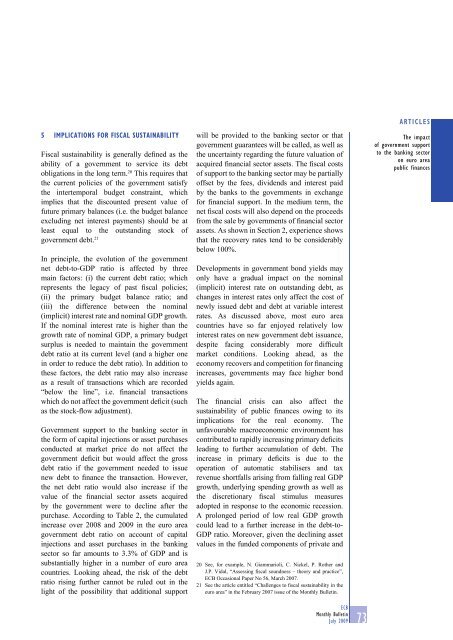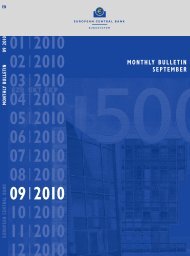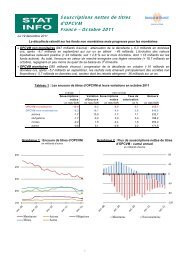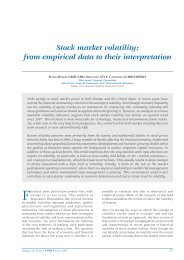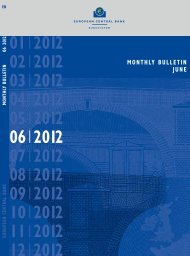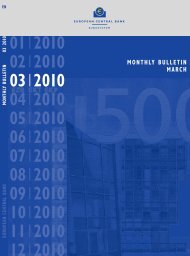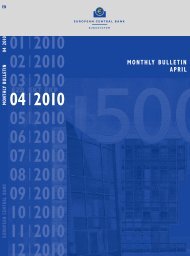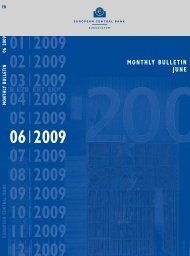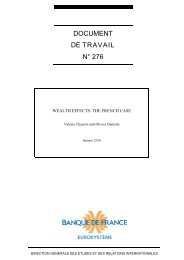Monthly Bulletin July 2009 - Banque de France
Monthly Bulletin July 2009 - Banque de France
Monthly Bulletin July 2009 - Banque de France
You also want an ePaper? Increase the reach of your titles
YUMPU automatically turns print PDFs into web optimized ePapers that Google loves.
5 IMPLICATIONS FOR FISCAL SUSTAINABILITY<br />
Fiscal sustainability is generally <strong>de</strong>fined as the<br />
ability of a government to service its <strong>de</strong>bt<br />
obligations in the long term. 20 This requires that<br />
the current policies of the government satisfy<br />
the intertemporal budget constraint, which<br />
implies that the discounted present value of<br />
future primary balances (i.e. the budget balance<br />
excluding net interest payments) should be at<br />
least equal to the outstanding stock of<br />
government <strong>de</strong>bt. 21<br />
In principle, the evolution of the government<br />
net <strong>de</strong>bt-to-GDP ratio is affected by three<br />
main factors: (i) the current <strong>de</strong>bt ratio; which<br />
represents the legacy of past fiscal policies;<br />
(ii) the primary budget balance ratio; and<br />
(iii) the difference between the nominal<br />
(implicit) interest rate and nominal GDP growth.<br />
If the nominal interest rate is higher than the<br />
growth rate of nominal GDP, a primary budget<br />
surplus is nee<strong>de</strong>d to maintain the government<br />
<strong>de</strong>bt ratio at its current level (and a higher one<br />
in or<strong>de</strong>r to reduce the <strong>de</strong>bt ratio). In addition to<br />
these factors, the <strong>de</strong>bt ratio may also increase<br />
as a result of transactions which are recor<strong>de</strong>d<br />
“below the line”, i.e. financial transactions<br />
which do not affect the government <strong>de</strong>ficit (such<br />
as the stock-flow adjustment).<br />
Government support to the banking sector in<br />
the form of capital injections or asset purchases<br />
conducted at market price do not affect the<br />
government <strong>de</strong>ficit but would affect the gross<br />
<strong>de</strong>bt ratio if the government nee<strong>de</strong>d to issue<br />
new <strong>de</strong>bt to finance the transaction. However,<br />
the net <strong>de</strong>bt ratio would also increase if the<br />
value of the financial sector assets acquired<br />
by the government were to <strong>de</strong>cline after the<br />
purchase. According to Table 2, the cumulated<br />
increase over 2008 and <strong>2009</strong> in the euro area<br />
government <strong>de</strong>bt ratio on account of capital<br />
injections and asset purchases in the banking<br />
sector so far amounts to 3.3% of GDP and is<br />
substantially higher in a number of euro area<br />
countries. Looking ahead, the risk of the <strong>de</strong>bt<br />
ratio rising further cannot be ruled out in the<br />
light of the possibility that additional support<br />
will be provi<strong>de</strong>d to the banking sector or that<br />
government guarantees will be called, as well as<br />
the uncertainty regarding the future valuation of<br />
acquired financial sector assets. The fiscal costs<br />
of support to the banking sector may be partially<br />
offset by the fees, divi<strong>de</strong>nds and interest paid<br />
by the banks to the governments in exchange<br />
for financial support. In the medium term, the<br />
net fiscal costs will also <strong>de</strong>pend on the proceeds<br />
from the sale by governments of financial sector<br />
assets. As shown in Section 2, experience shows<br />
that the recovery rates tend to be consi<strong>de</strong>rably<br />
below 100%.<br />
Developments in government bond yields may<br />
only have a gradual impact on the nominal<br />
(implicit) interest rate on outstanding <strong>de</strong>bt, as<br />
changes in interest rates only affect the cost of<br />
newly issued <strong>de</strong>bt and <strong>de</strong>bt at variable interest<br />
rates. As discussed above, most euro area<br />
countries have so far enjoyed relatively low<br />
interest rates on new government <strong>de</strong>bt issuance,<br />
<strong>de</strong>spite facing consi<strong>de</strong>rably more difficult<br />
market conditions. Looking ahead, as the<br />
economy recovers and competition for financing<br />
increases, governments may face higher bond<br />
yields again.<br />
The financial crisis can also affect the<br />
sustainability of public finances owing to its<br />
implications for the real economy. The<br />
unfavourable macroeconomic environment has<br />
contributed to rapidly increasing primary <strong>de</strong>ficits<br />
leading to further accumulation of <strong>de</strong>bt. The<br />
increase in primary <strong>de</strong>ficits is due to the<br />
operation of automatic stabilisers and tax<br />
revenue shortfalls arising from falling real GDP<br />
growth, un<strong>de</strong>rlying spending growth as well as<br />
the discretionary fiscal stimulus measures<br />
adopted in response to the economic recession.<br />
A prolonged period of low real GDP growth<br />
could lead to a further increase in the <strong>de</strong>bt-to-<br />
GDP ratio. Moreover, given the <strong>de</strong>clining asset<br />
values in the fun<strong>de</strong>d components of private and<br />
20 See, for example, N. Giammarioli, C. Nickel, P. Rother and<br />
J.P. Vidal, “Assessing fiscal soundness – theory and practice”,<br />
ECB Occasional Paper No 56, March 2007.<br />
21 See the article entitled “Challenges to fiscal sustainability in the<br />
euro area” in the February 2007 issue of the <strong>Monthly</strong> <strong>Bulletin</strong>.<br />
ARTICLES<br />
The impact<br />
of government support<br />
to the banking sector<br />
on euro area<br />
public finances<br />
ECB<br />
<strong>Monthly</strong> <strong>Bulletin</strong><br />
<strong>July</strong> <strong>2009</strong><br />
73


